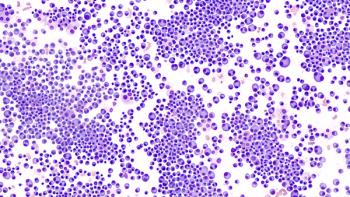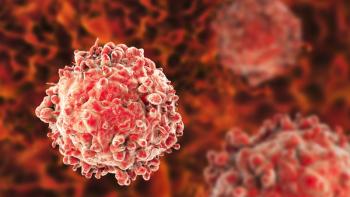
- October 2022
- Volume 16
- Issue 5
Caring for the Caregiver: Practical Tips for Oncology Nurses
Approximately 19.2% of American adults are caregivers for individuals 18 years or older. An estimated 6% care for a loved one with cancer.
Whenever Debbie Legault’s phone rings, she knows exactly what to do. Close eyes. Breathe in. Breathe out. Reset. “Hello? This is Debbie.”
Debbie is a caregiver. It is a role she hadn’t anticipated, especially after being repeatedly told that the lump in her daughter’s breast was nothing to worry about. If there was a possibility it might have been malignant, she would have taken time off from work, caught the next flight to Canada, and waited by her daughter’s side for the test results. Just in case.
But thankfully, there was no cause for concern. Her daughter was young, only 27. There was no family history of cancer. The doctor, nurses, lab staff, and imaging technicians had assured her that it wouldn’t be anything serious. On the day the results came back, Debbie went about her usual routine and waited for her daughter’s call confirming that the lump was benign. Then the phone rang—and suddenly, she was a caregiver.
According to a report issued by the National Alliance for Caregiving and AARP, the number of individuals in the US aged 18 years and older who provide unpaid care to relatives or friends 18 years or older rose from 39.8 million in 2015 to 47.9 million in 2020, which means that at least 19.2% of American adults are caregivers. An estimated 6% care for a loved one with cancer.1
To learn more about the needs of caregivers and the ways in which oncology nurses can support them, Oncology Nursing News® interviewed Debbie, Michelle Mollica, PhD, MPH, RN, OCN; and Sharon Cavone, BSN, RN, OCN.
When asked about her daughter’s medical team, Debbie is quick to point out that although reassurance is very important, “honesty would have been better. Had anyone said there was a possibility the lump could be breast cancer, and to be prepared, I would never have let her go into that appointment alone. Everyone assured us it would be benign. Of course, a piece of that was our own denial.”
After the diagnosis, however, “the machine that kicked in was quite magnificent [and] everything happened quickly.” To do what her daughter needed done, Debbie left behind her husband, her home, job, and life in the US and flew to Canada. The diagnosis sent her world reeling.
Caregivers face substantial stress, with 62% reporting a high burden and 43% saying they must carry out complex tasks for which they are unprepared.2 Giving care, whether voluntarily (46%) or not (53%), affects the physical, social, and emotional health and well-being of caregivers, their employment, and financial stability. Those who feel they don’t have a choice in the matter experience the highest levels of stress.1
Debbie recalls feeling a great deal of anger, an emotion she intentionally kept to herself. “The cancer care team did not help me with my anger because I did not take it with me…to the clinic. I was…angry about what was happening to my child…angry at the universe. Underneath the anger, I never felt so helpless in all my life. It was crippling, suffocating.…I felt angry, but in conversation I would be calm and caring. The voices were screaming so loud in my head, I thought everyone could hear them.”
Loneliness was something else Debbie, like other caregivers, experienced. “I felt separate from everyone. I took my role as a caregiver very seriously. I didn’t let anyone in, not even my husband of 38 years.” One nurse, however, made all the difference. Rather than seeing her daughter as a patient with cancer, she saw her as a peer and talked to her about things people their age typically discuss. “She would be changing the IV and talking with her about boyfriend problems, like she was talking to…someone in the office,” Debbie said, but she made it clear that the nurse in question was the exception, not the rule.
Michelle Mollica, deputy director of the Office of Cancer Survivorship at the National Cancer Institute (NCI), has researched caregiver stress and burden and authored numerous articles on the subject.3-5 She noted that although the health of the patient affects that of the caregiver, the reverse is also true and that supporting caregivers begins by acknowledging their needs. “Caregivers are focused on their loved one’s health and not always comfortable advocating for themselves.” She encourages oncology nurses to pay attention to caregivers and ask how they’re feeling.
“Caregivers of cancer patients are increasingly being asked to do more,” Mollica said, “including delivering treatments at home, making sure medications are taken, monitoring symptoms, and knowing when to call the doctor.” Nurses play a key role in making sure caregivers have the education and training needed to perform such work. Identifying and accommodating their learning preferences is very important, as is offering them the help of social workers, case managers, patient navigators, the NCI, and online support groups to help caregivers receive the services that they need.
Debbie agrees that social workers and others, including volunteers, can be very helpful, but she would like to see them become part of the standard of practice and be readily available on the unit, rather than only upon request. “The nurses were busy doing complex work, and sitting down with a caregiver requires time. Addressing all their emotions and questions…requires more than a few…minutes. An IV may start beeping, and they must jump up and handle it.” Which is why it was easier for her to ignore her needs than to wait for a nurse to have time to talk.
Cavone, who has spent more than 35 years working with oncology patients, is well-acquainted with the hectic pace of nursing and offered a few tips for them. Be they experts, novices, or simply unsure about their relationship with a caregiver, they should “go in and be warm,” she said. “Put your hand on the patient or caregiver, or ask permission to do so. Introduce yourself in a warm way, and when you are uncomfortable or don’t have the answers, ask questions, such as ‘What worked for you in the past? What is the way you like this done?’—whether it’s a port being accessed or being awakened for vital signs. Engage both the patient and the caregiver and ask about their concerns upfront.” Taking a few minutes to do this sets a tone of trust and openness.
Another of Cavone’s anti-angst tips is to use inclusive language: “Talk to the patient and caregiver as a unit; speak in terms that convey a team effort.…Rather than…‘For nausea, offer ginger candy,’ say, ‘We can help someone with nausea feel better by giving them ginger candy.’ Using ‘we’ language will help the caregiver feel part of a team whose goal is… achieving the best possible outcome.” She also suggests allowing caregivers to express their feelings and—regardless of what they might think—respond by saying, “Let’s look at that, but first I want to make sure you hear what I have to say.” Then nurses should relay the information, specify where it comes from, and emphasize that it is evidencebased and that standards of practice are developed in accordance with clinical research.
Building a relationship with a caregiver will also counteract fear or antagonism that is not based on fact. By validating caregivers’ feelings without being thrown by them, nurses have an opportunity to teach. If a caregiver insists their loved one receives a certain supplement, for instance, the nurse can simply ask if they have told the doctor or pharmacy and mention that certain professionals, like nutritionists, may be better able to understand their concerns. Nurses tend to believe that people expect them to have all the answers, but they can—and should— network with others.
“People have strong views about what constitutes usual care, even with cancer,” Cavone said. Therefore, nurses should “learn not to react, but [instead]…listen and dissect what the caregiver is saying. Make sure the person asking the question or voicing the concern is heard, yet impart the evidence-based information you need to impart. This will help build relationships and open avenues of understanding.”
Cavone also urges nurses to determine whether a caregiver is just venting or looking for a solution, and to respond accordingly. If unsure, they should ask. Maybe caregivers need answers, or maybe they’re overwhelmed or unprepared to manage ostomy bags, feeding tubes, and chemotherapy pumps. Maybe they need a break or a day away. Nurses should hear them out and offer respite care, counseling, or information about coordinating care or navigating the health care system. They should invite the caregiver or relative to be part of the discussion, address their concerns, and tell them where to get help, how to find out more, and when to contact the clinic or emergency help line.
Debbie’s experience was eye-opening and life-changing. She knows that it’s never over, that you can never “un-have” cancer. Everything her daughter does is informed by the fact that she had cancer. Debbie is passionate about helping others, so she writes and speaks about her experience. “Once you have cancer,” she said, “it seems you become cancer. Every backache, every headache raises the question, ‘Is this nothing, or is this not?’ It’s insidious. One cell could be hiding.” And whenever the phone rings, she knows exactly what to do. Close eyes. Breathe in. Breathe out. Reset.
References
1. National Alliance for Caregiving and AARP. Caregiving in the U.S. 2020. May 2020. Accessed September 13, 2022. https://bit.ly/3U9vl3o
2. Irwin MM, Dudley W, Northouse L, Berry DL, Mallory GA. Oncology nurses’ knowledge, confidence, and practice in addressing caregiver strain and burden. Oncol Nurs Forum. 2018;45(2):187-196. doi:10.1188/18.ONF.187-196
3. Mollica MA, Kent EE. Caregiver education and training: learning preferences of informal caregivers of adult care recipients. Clin J Oncol Nurs. 2021;25(4):483-487. doi:10.1188/21.CJON.483-487
4. Mollica MA, Wilder Smith A, Kent EE. Caregiving tasks and unmet supportive care needs of family caregivers: a U.S. population-based study. Patient Educ Couns. 2020;103(3):626-634. doi:10.1016/j.pec.2019.10.015
5. Mollica MA, Litzelman K, Rowland JH, Kent EE. The role of medical/nursing skills training in caregiver confidence and burden: a CanCORS study. Cancer. 2017;123(22):4481-4487. doi:10.1002/cncr.30875
Articles in this issue
about 3 years ago
Helping Patients Navigate Complementary Treatmentsabout 3 years ago
Supporting the Novice Oncology NP: The Benefits of PreceptorshipNewsletter
Knowledge is power. Don’t miss the most recent breakthroughs in cancer care.















































































